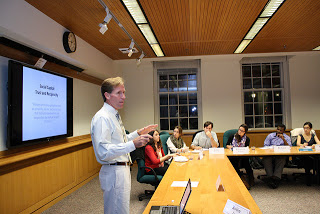- Public Policy
- Leadership
- Funding
- News & Events
- About the Center
Back to Top Nav
Back to Top Nav
Back to Top Nav
Back to Top Nav

Professor Ronald Shaiko addressed the Fellows, asking them to consider social capital in the context of Dartmouth and beyond. He also called attention to the way non-for-profits operate and to civil society as a whole. Professor Shaiko gave numerous examples including the World Bank, naming it as an entity that embodies the third sector definition. In these organizations, action is more collective than individual, but leaders are needed to relate to those group behaviors in order to accomplish the organization’s goals.
The Fellows were also introduced to two different kinds of social capital prevalent across all sectors—bridging and bonding. We were encouraged to think of both kinds in the context of the College, and to be aware of the darker side of social capital. Bonding is a reinforcement of homogeneity and as a result can bring about greater exclusivity. Bridging, on the other hand, is more likely to foster inclusion but instigates a “thin trust” tie, as opposed to the “thick trust” of bonding.
Fellows were then asked to brainstorm specific institutions and groups on campus that utilized either kind of social capital. The Leadership Fellows program and the homecoming bonfire were mentioned among those that fell into the bridging category while Greek houses were offered as examples of campus bonding. Taking the concepts learned beyond the Dartmouth bubble, Professor Shaiko named the cities Beirut and Bagdad as real-world examples that are characterized by bonding at the exclusion of bridging. The Fellows left the session with a heightened awareness of the communities engineered around them, and a better understanding of the not-for-profit sector.
-Molly Hassell '13